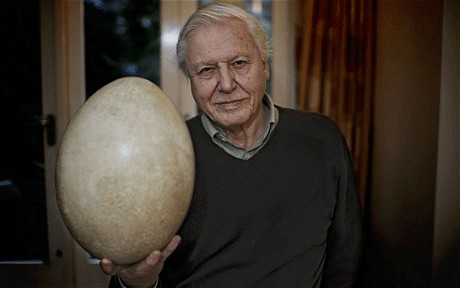 Here is the long-sought answer to the age-old question “Which came first, the chicken or the egg?” : the egg. Eggs have been around since some of the earliest animals – like sponges and jellyfish – evolved, about 600 million years ago. Birds have been around for about 150 million years and chickens perhaps 2000 years. Clearly, the egg came first.
Here is the long-sought answer to the age-old question “Which came first, the chicken or the egg?” : the egg. Eggs have been around since some of the earliest animals – like sponges and jellyfish – evolved, about 600 million years ago. Birds have been around for about 150 million years and chickens perhaps 2000 years. Clearly, the egg came first.
The largest egg of any living bird is that of the Ostrich. One Ostrich egg could contain the contents of twenty-four chicken eggs. It only takes only one Ostrich egg to fill up a large frying pan as it is approximately 5-6 inches in diameter and 6-7 inches tall (with a 1/8 inch thick shell.) The largest egg ever laid by a bird was that of the Elephant Bird of Madagascar. Extinct since about 1700, it is the largest bird known to exist , weighing 1000 lbs and standing 10 feet tall with an egg 15 times larger than an ostrich egg. Although larger birds lay larger eggs than smaller birds, small birds have proportionately larger eggs. Sixty ostrich eggs equal the weight of one adult ostrich but it takes only about nine hummingbird eggs to weigh as much as the hummingbird. About the size of a chicken, Kiwis lay eggs that are three times the size of a chicken egg and only four kiwi eggs equal the weight of a Kiwi!

In the 19th century, bird egg collecting for both scientific and recreational purposes was popular. Individuals, and groups like a Boy Scout Troop, would collect, trade, and display eggs, much as we do stamps and coins today. A journal for collectors, the Oologist, reported on these activities and offered eggs for sale and trade. But in the latter part of that century, it was beginning to be recognized that recreational egg hunting was affecting bird populations.
What if you find a wild bird egg? The best thing you can do is respect the Migratory Bird Treaty Act and leave the egg alone. In most cases it is unlikely the egg would hatch. While it is always a disappointment finding a bird egg left or abandoned in a nest, there is little more we can do but accept that this as a part of nature. Birds themselves are the best resource for incubating and raising young. The chances of successfully hatching a wild bird egg and raising the young by someone with little experience are slim.
Our familiarity with eggs comes mainly from chickens, so to answer another age-old chicken question, brown eggs come from chickens with brown feathers and white eggs come from chickens that have white feathers. The nutritional value is exactly the same.
OK; here is your take-home assignment. Bird eggs are stronger than they seem. Try this simple experiment. Take off any rings you might have on your dominant hand and grasp a chicken egg. Then squeeze as hard as you can, evenly around the egg, to try to break it. Do it over a sink, just in case. It’s hard to do because the shell is strong. The hard shell is composed mainly of calcium carbonate crystals deposited on a protein matrix. Place an egg in a glass of vinegar. After a few hours the calcium carbonate will have dissolved and the you will be able to see the protein matrix and actually roll the now elastic egg around.
The elephant bird egg is so big it makes me wonder how big the elephant bird itself is!!!!!!!!!
The Elephant Bird stood 10 feet tall and weighed 1600 pounds.